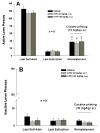Cocaine-taking and cocaine-seeking behaviors in rats remain stable after systemic administration of GYKI 52466: a non-competitive AMPA receptor antagonist
- PMID: 22206835
- PMCID: PMC3267379
- DOI: 10.1016/j.neulet.2011.12.028
Cocaine-taking and cocaine-seeking behaviors in rats remain stable after systemic administration of GYKI 52466: a non-competitive AMPA receptor antagonist
Abstract
Given the posited role of enhanced AMPA-mediated synaptic transmission in relapse to drug seeking, we investigated whether systemic administration of the AMPA receptor antagonist GYKI 52466 inhibits cocaine-taking and cocaine-seeking behavior in rats. Rats were trained to self-administer cocaine until stable self-administration was achieved. Effects of GYKI 52466 (1, 3, or 10mg/kg, i.v.) on cocaine self-administration were assessed. Animals were allowed to re-establish stable cocaine self-administration and were then behaviorally extinguished from drug taking. The effects of GYKI 52466 (3, 10mg/kg, i.v.) on cocaine-induced reinstatement of drug-seeking behavior were assessed. We found that GYKI 52466 failed to inhibit cocaine-taking and cocaine-seeking in both the self-administration and reinstatement paradigms. We suggest that although AMPA receptors may be involved in cocaine reward and addiction, the AMPA receptor antagonist GYKI 52466 has low therapeutic potential for cocaine addiction treatment.
Published by Elsevier Ireland Ltd.
Figures


Similar articles
-
Cocaine administered into the medial prefrontal cortex reinstates cocaine-seeking behavior by increasing AMPA receptor-mediated glutamate transmission in the nucleus accumbens.J Neurosci. 2002 Apr 1;22(7):2916-25. doi: 10.1523/JNEUROSCI.22-07-02916.2002. J Neurosci. 2002. PMID: 11923456 Free PMC article.
-
Subregion-specific role of glutamate receptors in the nucleus accumbens on drug context-induced reinstatement of cocaine-seeking behavior in rats.Addict Biol. 2012 Mar;17(2):287-99. doi: 10.1111/j.1369-1600.2011.00325.x. Epub 2011 Apr 26. Addict Biol. 2012. PMID: 21521425 Free PMC article.
-
Interactions between VTA orexin and glutamate in cue-induced reinstatement of cocaine seeking in rats.Psychopharmacology (Berl). 2013 Apr;226(4):687-98. doi: 10.1007/s00213-012-2681-5. Epub 2012 Mar 13. Psychopharmacology (Berl). 2013. PMID: 22411428 Free PMC article.
-
Drug Refraining and Seeking Potentiate Synapses on Distinct Populations of Accumbens Medium Spiny Neurons.J Neurosci. 2018 Aug 8;38(32):7100-7107. doi: 10.1523/JNEUROSCI.0791-18.2018. Epub 2018 Jul 5. J Neurosci. 2018. PMID: 29976626 Free PMC article.
-
Negative allosteric modulation of AMPA-preferring receptors by the selective isomer GYKI 53784 (LY303070), a specific non-competitive AMPA antagonist.CNS Drug Rev. 2002 Fall;8(3):235-54. doi: 10.1111/j.1527-3458.2002.tb00227.x. CNS Drug Rev. 2002. PMID: 12353057 Free PMC article. Review.
Cited by
-
Role of cues and contexts on drug-seeking behaviour.Br J Pharmacol. 2014 Oct;171(20):4636-72. doi: 10.1111/bph.12735. Epub 2014 Jul 2. Br J Pharmacol. 2014. PMID: 24749941 Free PMC article. Review.
References
-
- Anderson SM, Pierce RC. Cocaine-induced alterations in dopamine receptor signaling: implications for reinforcement and reinstatement. Pharmacol Ther. 2005;106:389–403. - PubMed
-
- Donevan SD, Rogawski MA. GYKI 52466, a 2,3-benzodiazepine, is a highly selective, noncompetitive antagonist of AMPA/kainate receptor responses. Neuron. 1993;10:51–9. - PubMed
Publication types
MeSH terms
Substances
Grants and funding
LinkOut - more resources
Full Text Sources

